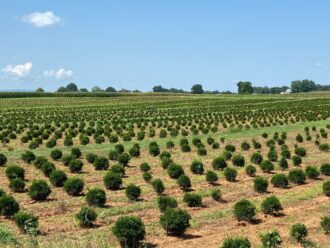In Tennessee, innovative research into biofumigant cover cropping practices has provided nursery producers with new options for managing diseases while reducing workers’ exposure to chemicals.
Fulya Baysal-Gurel of Tennessee State University (TSU) led the study at the Otis Floyd Nursery Research Center, working in partnership with nursery producers and graduate students. With support from a Southern SARE Partnership Grant, the project investigated the efficacy of using brassica cover crops as a biofumigant to suppress Phytophthora root and crown rot in boxwood production. The team conducted research both in controlled university settings and in on-farm trials, where the biofumigation practice successfully reduced disease severity in treated plots compared to untreated areas.
“We conducted on-farm trials in two nursery growers’ fields where they had the problem in their production. We inserted this rotation program into 10-acre areas, and at the end of our study, we were able to suppress soilborne disease severity by over 50% on the treated plots compared to non-use areas,” said Baysal-Gurel.
TSU’s outreach efforts extended the results to nursery industry associations, peer-reviewed publications, and sustainable agriculture conferences. These engagements strengthened networks between researchers and producers, fostering further collaboration on sustainability initiatives.
The project demonstrated great promise for having major impacts on environmental, economic and social sustainability. Adoption of biofumigant cover cropping by Tennessee nursery growers has the potential to reduce their reliance on chemical fungicides and improve soil health, but additional research is needed first.
“We are seeing the impact on the disease severity, but many questions come with that,” said Baysal-Gurel. “Growers see the efficacy but are questioning me about the economic cost and compatibility with their production practices.”
Visit https://www.sare.org/sare-impacts-OS18-112 for more information on this project's impact.
For more information, see “Biofumigation: Opportunities and Challenges for Control of Soilborne Diseases in Nursery Production.”
Biofumigants for Sustainable Soil-borne Disease Management in Nursery Production is part of a series produced by Insight for Action as part of a post-project evaluation of SARE's regional grant programs. For more information visit https://www.sare.org/sare-impacts.
For information on grants and resources available from SARE, visit www.sare.org.
